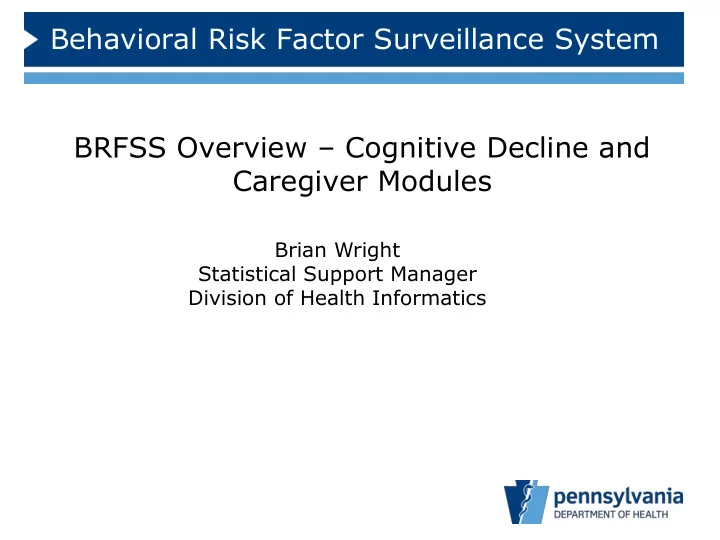

Behavioral Risk Factor Surveillance System BRFSS Overview – Cognitive Decline and Caregiver Modules Brian Wright Statistical Support Manager Division of Health Informatics
Behavioral Risk Factor Surveillance System • BRFSS is a CDC sponsored telephone survey • Pennsylvania participating since 1989 • Largest telephone health survey worldwide • Core questions and state selected modules and questions
Behavioral Risk Factor Surveillance System • Purpose of a survey • Population – PA adults age 18 & over • Sampling Frame • Coverage • Bias • Cell phones added in 2011 along with new weighting method
Behavioral Risk Factor Surveillance System
Behavioral Risk Factor Surveillance System • Cognitive Decline module (6 questions) Included in 2018 (and 2019) survey In 2014, the Cognitive Impairment module included • Caregiver module Included in 2015 survey Included in 2017 (4 of 9), 2018 (4 of 9), 2019 (5 of 9)
Behavioral Risk Factor Surveillance System 1. During the past 12 months, have you experienced confusion or memory loss that is happening more often or is getting worse? Yes No don’t know/unsure refused 2. During the past 12 months, as a result of confusion or memory loss, how often have you given up day-to-day household activities or chores you used to do, such as cooking, cleaning, taking medications, driving, or paying bills? 3. As a result of confusion or memory loss, how often do you need assistance with these day-to-day activities? 4. When you need help with these day-to-day activities, how often are you able to get the help that you need? 5. During the past 12 months, how often has confusion or memory loss interfered with your ability to work, volunteer, or engage in social activities outside the home? 6. Have you or anyone else discussed your confusion or memory loss with a health care professional?
Behavioral Risk Factor Surveillance System 1. During the past 12 months, have you experienced confusion or memory loss that is happening more often or is getting worse? Yes No don’t know/unsure refused Demographic Sample Size Number Percent CI Low CI High Year 3,417 349 10 9 12 2018 All Adults, Age GE 45
Behavioral Risk Factor Surveillance System 2. During the past 12 months, as a result of confusion or memory loss, how often have you given up day-to-day household activities or chores you used to do, such as cooking, cleaning, taking medications, driving, or paying bills? Always Usually Sometimes Rarely Never dk/unsure refused Demographic Sample Size Number Percent CI Low CI High Year 364 50 15 11 20 2018 All Adults, Age GE 45 3. As a result of confusion or memory loss, how often do you need assistance with these day-to-day activities? Demographic Sample Size Number Percent CI Low CI High Year 364 46 13 9 18 2018 All Adults, Age GE 45
Behavioral Risk Factor Surveillance System 4. When you need help with these day-to-day activities, how often are you able to get the help that you need? Always or Usually Demographic Sample Size Number Percent CI Low CI High Year 108 75 70 56 81 2018 All Adults, Age GE 45 Sometimes or Rarely Demographic Sample Size Number Percent CI Low CI High Year 108 33 30 19 44 2018 All Adults, Age GE 45
Behavioral Risk Factor Surveillance System 5. During the past 12 months, how often has confusion or memory loss interfered with your ability to work, volunteer, or engage in social activities outside the home? Always or Usually Demographic Sample Size Number Percent CI Low CI High Year 362 59 18 13 23 2018 All Adults, Age GE 45 6. Have you or anyone else discussed your confusion or memory loss with a health care professional? Demographic Sample Size Number Percent CI Low CI High Year 363 180 51 45 58 2018 All Adults, Age GE 45
Behavioral Risk Factor Surveillance System During the past 30 days, did you provide regular care or assistance to a friend or family member who has a health problem or disability? Yes Demographic Sample Size Number Percent CI Low CI High Year 5,102 1,172 24 22 25 2018 All Adults What is the main health problem, long-term illness, or disability that the person you care for has? Alzheimer’s disease, dementia or other cognitive impairment disorder Demographic Sample Size Number Percent CI Low CI High Year 1,124 150 12 10 14 2018 All Adults
Behavioral Risk Factor Surveillance System • Explore the BRFSS survey results on the Health Statistics web pages www.statistics.health.pa.us • Referred to as subjective (self-reported) cognitive decline • Purpose is to help describe the problems associated with increased confusion or memory loss • Requests for BRFSS content solicited in August/September • Contact Us link on the Health Statistics web pages
Recommend
More recommend